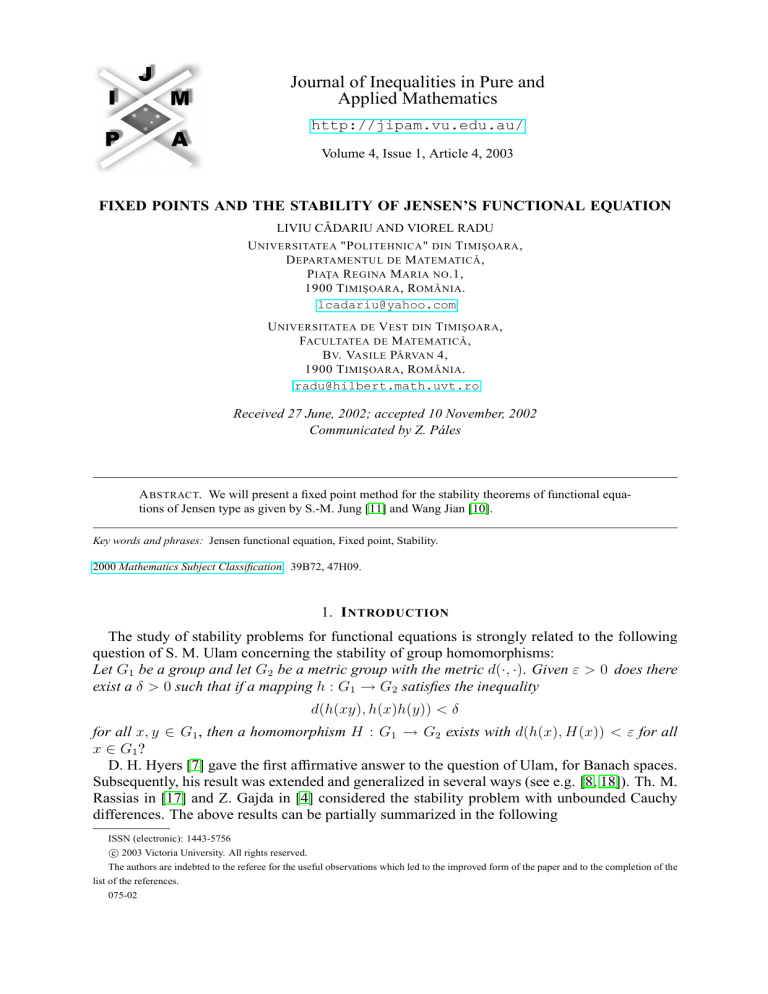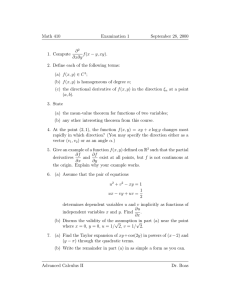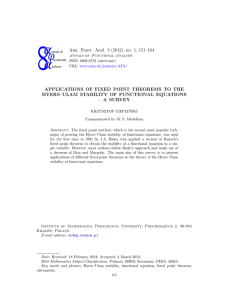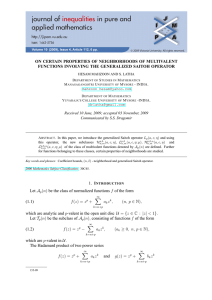
Journal of Inequalities in Pure and
Applied Mathematics
http://jipam.vu.edu.au/
Volume 4, Issue 1, Article 4, 2003
FIXED POINTS AND THE STABILITY OF JENSEN’S FUNCTIONAL EQUATION
LIVIU CǍDARIU AND VIOREL RADU
U NIVERSITATEA "P OLITEHNICA " DIN T IMI ŞOARA ,
D EPARTAMENTUL DE M ATEMATIC Ǎ ,
P IAŢA R EGINA M ARIA NO .1,
1900 T IMI ŞOARA , ROMÂNIA .
lcadariu@yahoo.com
U NIVERSITATEA DE V EST DIN T IMI ŞOARA ,
FACULTATEA DE M ATEMATIC Ǎ ,
B V. VASILE PÂRVAN 4,
1900 T IMI ŞOARA , ROMÂNIA .
radu@hilbert.math.uvt.ro
Received 27 June, 2002; accepted 10 November, 2002
Communicated by Z. Páles
A BSTRACT. We will present a fixed point method for the stability theorems of functional equations of Jensen type as given by S.-M. Jung [11] and Wang Jian [10].
Key words and phrases: Jensen functional equation, Fixed point, Stability.
2000 Mathematics Subject Classification. 39B72, 47H09.
1. I NTRODUCTION
The study of stability problems for functional equations is strongly related to the following
question of S. M. Ulam concerning the stability of group homomorphisms:
Let G1 be a group and let G2 be a metric group with the metric d(·, ·). Given ε > 0 does there
exist a δ > 0 such that if a mapping h : G1 → G2 satisfies the inequality
d(h(xy), h(x)h(y)) < δ
for all x, y ∈ G1 , then a homomorphism H : G1 → G2 exists with d(h(x), H(x)) < ε for all
x ∈ G1 ?
D. H. Hyers [7] gave the first affirmative answer to the question of Ulam, for Banach spaces.
Subsequently, his result was extended and generalized in several ways (see e.g. [8, 18]). Th. M.
Rassias in [17] and Z. Gajda in [4] considered the stability problem with unbounded Cauchy
differences. The above results can be partially summarized in the following
ISSN (electronic): 1443-5756
c 2003 Victoria University. All rights reserved.
The authors are indebted to the referee for the useful observations which led to the improved form of the paper and to the completion of the
list of the references.
075-02
2
L IVIU C ǍDARIU AND V IOREL R ADU
Theorem 1.1. (Hyers-Rassias-Gajda) [4, 8, 17]. Suppose that E is a real normed space, F is
a real Banach space, f : E → F is a given function, and the following condition holds
(Cp )
kf (x + y) − f (x) − f (y)kF ≤ θ(kxkpE + kykpE ), ∀x, y ∈ E,
for some p ∈ [0, ∞)\{1}. Then there exists a unique additive function c : E → F such that
(Estp )
||f (x) − c(x)||F ≤
2θ
kxkpE , ∀x ∈ E.
|2 − 2p |
This phenomenon is called generalized Hyers-Ulam stability. It is worth noting that almost
all subsequent proofs in this very active area used the Hyers’ method. Namely, the function
c : E → F is explicitly constructed, starting from the given function f , by the formulae
(jp<1 )
c(x) = lim
1
f (2n x),
n→∞ 2n
if p < 1;
(jp>1 )
x
c(x) = lim 2 f n ,
n→∞
2
if p > 1.
n
This method is called a direct method.
There are known also other approaches, for example using the invariant mean technique
introduced by Szekelyhidi (see e.g. [22, 23]), or based on the sandwich theorems (see [14]).
The interested reader is referred to the expository papers [3, 18, 24] and the book [8].
One of the present authors observed recently (see [16]) that the existence of c and the estimation (Estp ) can be obtained from the fixed point alternative.
We will show how this method can be applied to stability theorems of Jensen type, that is
starting from initial conditions of the form
x+y
− f (x) − f (y) ≤ ϕ(x, y), ∀x, y ∈ E.
(Jϕ )
2f
2
F
As a particular case, we obtain a new proof for the following theorem:
Theorem 1.2. (compare with [11, 12]). Let p ≥ 0 be given, with p 6= 1. Assume that δ ≥ 0 and
θ ≥ 0 are fixed. Suppose that the mapping f : E → F satisfies the inequality
x+y
(Jp )
2f
− f (x) − f (y) ≤ δ + θ(kxkp + kykp ), ∀x, y ∈ E,
2
F
Further, assume f (0) = δ = 0 in the case p > 1.
Then there exists a unique additive mapping j : E → F such that
(Estp<1 )
kf (x) − j(x)k ≤
δ
21−p
−1
+ kf (0)k +
θ
21−p
−1
kxkp , ∀x ∈ E,
or
(Estp>1 )
2p−1 θ
kf (x) − j(x)k ≤ p−1
kxkp , ∀x ∈ E.
2
−1
For the proof, see Section 3.
We think that our method of proof is working in more situations, allowing to obtain, in a
simple manner, general stability theorems.
J. Inequal. Pure and Appl. Math., 4(1) Art. 4, 2003
http://jipam.vu.edu.au/
F IXED P OINT AND S TABILITY
3
2. T HE A LTERNATIVE OF F IXED P OINT
For the sake of convenience and for explicit later use, we will recall two fundamental results
in fixed point theory.
Theorem 2.1. (Banach’s contraction principle). Let (X, d) be a complete metric space, and
consider a mapping J : X → X, which is strictly contractive, that is
d(Jx, Jy) ≤ Ld (x, y) , ∀x, y ∈ X,
(B1 )
for some ( Lipschitz constant ) L < 1. Then
(i) The mapping J has one, and only one, fixed point x∗ = J (x∗ ) ;
(ii) The fixed point x∗ is globally attractive, that is
lim J n x = x∗ ,
(B2 )
n→∞
for any starting point x ∈ X;
(iii) One has the following estimation inequalities:
d (J n x, x∗ ) ≤ Ln d (x, x∗ ) , ∀n ≥ 0, ∀x ∈ X;
(B3 )
d (J n x, x∗ ) ≤
(B4 )
1
d(J n x, J n+1 x), ∀n ≥ 0, ∀x ∈ X;
1−L
d (x, x∗ ) ≤
(B5 )
1
d (x, Jx) , ∀x ∈ X.
1−L
Theorem 2.2. (The alternative of fixed point) [13, 19]. Suppose we are given a complete generalized metric space (X, d) and a strictly contractive mapping J : X → X, with the Lipschitz
constant L. Then, for each given element x ∈ X, either
d(J n x, J n+1 x) = +∞ , ∀n ≥ 0,
(A1 )
or
(A2 )
There exists a natural number n0 such that:
(A20 )
(A21 )
(A22 )
(A23 )
d(J n x, J n+1 x) < +∞, ∀n ≥ n0 ;
The sequence (J n x) is convergent to a fixed point y ∗ of J;
y ∗ is the unique fixed point of J in the set Y = {y ∈ X, d (J n0 x, y) < +∞} ;
1
d (y, y ∗ ) ≤ 1−L
d (y, Jy) , ∀y ∈ Y.
Remark 2.3.
(a) The fixed point y ∗ , if it exists, is not necessarily unique in the whole space X; it may
depend on x.
(b) Actually, if (A2 ) holds, then (Y, d) is a complete metric space and J (Y ) ⊂ Y. Therefore
the properties (A21 ) − (A23 ) are easily seen to follow from Theorem 2.1.
3. A G ENERALIZED T HEOREM
OF
S TABILITY
FOR
J ENSEN ’ S E QUATION
Using the fixed point alternative we can prove our main result, a generalized theorem of
stability for Jensen’s functional equation (see also [5, 10, 11, 12]):
J. Inequal. Pure and Appl. Math., 4(1) Art. 4, 2003
http://jipam.vu.edu.au/
4
L IVIU C ǍDARIU AND V IOREL R ADU
Theorem
3.1. Let E be a (real or complex) linear space, F and Banach space, and qi =
2, i = 0
. Suppose that the mapping f : E → F satisfies the condition f (0) = 0 and an
1
, i=1
2
inequality of the form
x+y
(Jϕ )
2f
− f (x) − f (y) ≤ ϕ(x, y), ∀x, y ∈ E,
2
F
where ϕ : E × E → [0, ∞) is a given function.
If there exists L = L(i) < 1 such that the mapping
x → ψ(x) = ϕ(x, 0)
has the property
x
ψ(x) ≤ L · qi · ψ
, ∀x ∈ E,
qi
(Hi )
and the mapping ϕ has the property
ϕ (2qin x, 2qin y)
= 0, ∀x, y ∈ E,
n→∞
2qin
(H∗i )
lim
then there exists a unique additive mapping j : E → F such that
kf (x) − j(x)kF ≤
(Esti )
L1−i
ψ(x), ∀x ∈ E.
1−L
Proof. Consider the set
X := {g : E → F, g (0) = 0}
and introduce the generalized metric on X :
d (g, h) = dψ (g, h) = inf {C ∈ R+ , kg (x) − h (x)kF ≤ Cψ(x), ∀x ∈ E}
It is easy to see that (X, d) is complete.
Now we will consider the (linear) mapping
J : X → X, Jg (x) :=
1
· g (qi x) .
qi
Note that q0 = 2 if (H0 ) holds, and q1 = 2−1 if (H1 ) holds.
We have, for any g, h ∈ X :
d(g, h) < C =⇒ kg (x) − h (x)kF ≤ Cψ(x), ∀x ∈ E
1
1
g (qi x) − h (qi x)
qi
qi
1
1
=⇒
g (qi x) − h (qi x)
qi
qi
=⇒ d (Jg, Jh) ≤ LC.
≤
=⇒
F
1
Cψ(qi x), ∀x ∈ E
qi
≤ LCψ(x), ∀x ∈ E
F
Therefore we see that
d (Jg, Jh) ≤ Ld (g, h) , ∀g, h ∈ X,
that is J is a strictly contractive self-mapping of X, with the Lipschitz constant L.
If the hypothesis (H0 ) holds, and we set x = 2t and y = 0 in the condition (Jϕ ) , then we
see that
1
1
f (t) − f (2t) ≤ ψ(2t) ≤ Lψ(t), ∀t ∈ E,
2
2
F
J. Inequal. Pure and Appl. Math., 4(1) Art. 4, 2003
http://jipam.vu.edu.au/
F IXED P OINT AND S TABILITY
5
that is d (f, Jf ) ≤ L = L1 < ∞. Now, if the hypothesis (H1 ) holds, and we set y = 0 in the
condition (Jϕ ), then we see that
x
2f
− f (x) ≤ ψ(x), ∀x ∈ E.
2
F
0
Therefore d (f, Jf ) ≤ 1 = L < ∞.
In both cases we can apply the fixed point alternative, and we obtain the existence of a
mapping j : X → X such that:
• j is a fixed point of J, that is
j (2x) = 2j (x) , ∀x ∈ E.
(3.1)
The mapping j is the unique fixed point of J in the set
Y = {g ∈ X, d (f, g) < ∞} .
This says that j is the unique mapping with both the properties (3.1) and (3.2), where
∃C ∈ (0, ∞) such that kj (x) − f (x)kF ≤ Cψ(x), ∀x ∈ E.
(3.2)
• d(J n f, j) −−−→ 0, which implies the equality
n→∞
f (qin x)
= j(x), ∀x ∈ X.
n→∞
qin
lim
(3.3)
1
d (f, Jf ) , which implies the inequality
1−L
L1−i
d(f, j) ≤
,
1−L
that is (Esti ) is seen to be true.
The additivity of j follows immediately from (Jϕ ) and (3.3): If in (Jϕ ) we replace x by 2qin x
and y by 2qin y, then we obtain
• d(f, j) ≤
f (qin (x + y)) f (2qin x) f (2qin y)
−
−
qin
2qin
2qin
F
ϕ (2qin x, 2qin y)
≤
, ∀x, y ∈ E.
2qin
Taking into account the hypothesis (H∗i ) and letting n → ∞, we get
j(x + y) = j (x) + j (y) ,
∀x, y ∈ E,
which ends the proof.
The proof of Theorem 1.2. If we suppose that f (0) = 0, then the proof follows from our Theorem 3.1 by taking
ϕ (x, y) := δ + θ(kxkp + kykp ), ∀x, y ∈ E,
which appears in the hypothesis (Jp ). We see that
ϕ (2qin x, 2qin y)
δ
= n + (2qin )p−1 θ(kxkp + kykp ) −−−→ 0,
n
n→∞
2qi
2qi
that is (H∗i ) is true, and our method works by the following reasons:
1
1
•
ψ(2x) = δ + 2p−1 θ kxkp ≤ 2p−1 ψ(x), for p < 1;
2
2
x
1
1
•
2ψ
= p−1 θ kxkp ≤ p−1 ψ(x), for p > 1,
2
2
2
which actually say that either (H0 ) holds with L = 2p−1 or (H1 ) holds with L =
J. Inequal. Pure and Appl. Math., 4(1) Art. 4, 2003
1
.
2p−1
http://jipam.vu.edu.au/
6
L IVIU C ǍDARIU AND V IOREL R ADU
The general case (for p < 1 ) follows immediately by considering the mapping fe = f −f (0) :
kf (x) − j(x)k ≤ fe(x) − j(x) + kf (0)k ≤
δ
21−p
−1
+ kf (0)k +
θ
21−p
−1
kxkp .
R EFERENCES
[1] C. BORELLI AND G.L. FORTI, On a general Hyers-Ulam stability result, Internat. J. Math. Math.
Sci., 18 (1995) 229–236.
[2] L. CĂDARIU AND V. RADU, The stability of Jensen’s functional equation: a fixed point approach,
Proceedings of the 8-th International Conference on Applied Mathematics and Computer Science,
Cluj-Napoca, 30 May – 02 June, (2002).
[3] G.L. FORTI, Hyers-Ulam stability of functional equations in several variables, Aequationes
Math., 50 (1995), 143–190.
[4] Z. GAJDA, On stability of additive mappings, Internat. J. Math. Math. Sci., 14 (1991), 431–434.
[5] P. GĂVRUŢĂ, A generalization of the Hyers-Ulam-Rassias stability of approximately additive
mappings, J. Math. Anal. Appl., 184 (1994) , 431–436.
[6] R. GER AND P. SEMRL, The stability of the exponential equation, Proc. Amer. Math. Soc., 124
(1996), 779–787.
[7] D.H. HYERS, On the stability of the linear functional equation, Proc. Natl. Acad. Sci. U.S.A., 27
(1941), 222–224.
[8] D.H. HYERS, G. ISAC AND Th.M. RASSIAS, Stability of Functional Equations in Several Variables, Birkhauser, Basel, 1998.
[9] G. ISAC AND Th.M. RASSIAS, On the Hyers-Ulam stability of ψ-additive mappings, J. Approx.
Theory, 72 (1993), 131–137.
[10] WANG JIAN, Some further generalizations of the Hyers-Ulam Rassias stability of functional equations, J. Math. Anal. Appl., 263 (2001), 406–423.
[11] S.M. JUNG, Hyers-Ulam-Rassias stability of Jensen’s equation and its application, Proc. Amer.
Math. Soc., 126 (1998), 3137–3143.
[12] YANG-HI LEE AND KIL-WOUNG JUN, A generalization of the Hyers-Ulam-Rassias stability of
Jensen’s equation, J. Math. Anal. Appl., 238 (1999), 305–315.
[13] B. MARGOLIS AND J.B. DIAZ, A fixed point theorem of the alternative for contractions on a
generalized complete metric space, Bull. Amer. Math. Soc., 126, 74 (1968), 305–309.
[14] Zs. PÁLES, Generalized stability of the Cauchy functional equation, Aequationes Math., 56(3)
(1998), 222–232.
[15] Zs. PÁLES, Hyers-Ulam stability of the Cauchy functional equation on square-symmetric grupoids,
Publ. Math. Debrecen, 58(4) (2001), 651–666.
[16] V. RADU, The fixed point alternative and the stability of functional equations, Seminar on Fixed
Point Theory Cluj-Napoca, ( to appear in vol. IV on 2003).
[17] Th.M. RASSIAS, On the stability of the linear mapping in Banach spaces, Proc. Amer. Math.
Soc., 72 (1978 ), 297–300.
[18] Th.M. RASSIAS, On the stability of functional equations and a problem of Ulam, Acta Applicandae
Mathematicae, 62 (2000), 23–130.
J. Inequal. Pure and Appl. Math., 4(1) Art. 4, 2003
http://jipam.vu.edu.au/
F IXED P OINT AND S TABILITY
7
[19] I.A. RUS, Principles and Applications of Fixed Point Theory, Ed. Dacia, Cluj-Napoca, 1979 (in
Romanian).
[20] I.A. RUS, Generalized Contractions and Applications, Cluj University Press, Cluj-Napoca, 2001.
[21] P. SEMRL, Hyers-Ulam stability of isometries on Banach spaces, Aequationes Math., 58 (1999),
157–162.
[22] L. SZÉKELYHIDI, On a stability theorem, C. R. Math. Rep. Acad. Sci. Canada, 3(5) (1981), 253–
255.
[23] L. SZÉKELYHIDI, The stability of linear functional equations, C. R. Math. Rep. Acad. Sci.
Canada, 3(2) (1981), 63–67.
[24] L. SZÉKELYHIDI, Ulam’s problem, Hyers’s solution and to where they led, in Functional Equations and Inequalities, Th. M. Rassias (Ed.), Vol. 518 of Mathematics and Its Applications, Kluwer
Acad. Publ., Dordrecht, (2000), 259–285.
[25] J. TABOR, A general stability result in the class of Lipschitz functions, Publ. Math. Debrecen, 55(3-4) (1999), 385–394.
J. Inequal. Pure and Appl. Math., 4(1) Art. 4, 2003
http://jipam.vu.edu.au/




